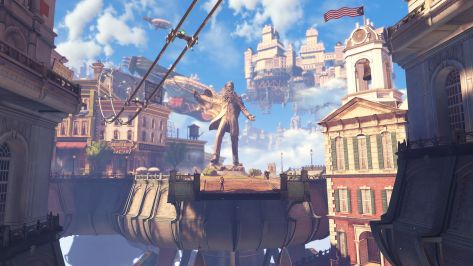“Bring us the girl, and wash away the debt.”
We are all guilty of the good we do not accomplish. Our sins, our faults, our mistakes—they are all reminders that we are, in the end, human. To carry such debts, be they mental, spiritual or physical, can be a driving force behind great change. What happens we our beliefs are challenged? Why do some of our grandest intentions often lead to the darkest of ambitions? There are so many questions, so many paths not taken in life that leave us wondering an endless list of what if’s
Bioshock Infinite is not simply a video game. It is a prolific journey into the very fabric of our realities, while also exploring questions of the depth of love, faith, and loss. Beautiful, adaptive, provocative and deeply thoughtful, Infinite is a masterful game that marries brilliant storytelling with near perfect video game design. While it is difficult enough to create a sequel that exceeds its predecessor, Bioshock Infinite achieves something far more rare—It raises the bar for the future of video games.
Booker Dewitt, a disgraced agent of the Pinkerton National Detective Agency, is tasked with finding and delivering a girl named Elizabeth to his employers. Haunted by his sins and plagued by debt, both financial and emotional, Dewitt is a gruff exterior hiding a far more fragile core, one that shuns religion and fumbles to find some way of absolving his sins more substantial than forgiveness. To him, he must pay a penance, and in that vein Infinite is an outward manifestation of Dewitt gaining the courage to choose to face his inner demons.
And yet, this is merely one of the many themes that craft such a poignant tale of survival and redemption. The story of Infinite is woven together by dozens of threads that touch on many religious, philosophical, and social levels. The city of Columbia itself is beautifully constructed, infused with Victorian, post-industrial, and science fiction architectures sprawled across the “landscape”. Underneath its shining surface, however, Columbia is a dystopia struggling to maintain balance and order through political and religious pressures. Its prophetic leader, Zachary Comstock, is a worthy antithesis to Dewitt as his commitment to his faith echoes throughout Columbia and tugs away at Dewitt’s skepticism.
Throughout its entirety, Bioshock Infinite permeates with uneasy tension that seeks to surprise and disorient the player, narratively and mechanically. Visions of awe and spectacle give way to unusual references to popular literature and songs that shouldn’t exist. Irrational does well to play with the expectations of the player, ensuring that what’s around the corner is never quite certain. Elizabeth herself, seemingly innocent and a victim to imprisonment throughout her life, shows hints of a darker element that prevents you from ever fully trusting her. It is a delicate ballet of hope and fear that makes the relationship between Dewitt and Elizabeth so fascinating to see as they discover deeper truths about each other.
Much like the original Bioshock, Infinite’s gameplay is very linear and firmly rooted in the shooter genre. That isn’t to say Infinite has its own way of tweaking the mechanics, of which it does in some ingenious ways. Irrational Games went to great lengths to make sure that every aspect of the game worked hand-in-hand with the narrative and the actual gameplay design, and it works brilliantly. The skyrail system used by the police to move about the city opens up the combat arenas, spreading the battle across several sections of the city simultaneously. Vigors, which give Dewitt special abilities very similar to the plasmids used in the original Bioshock, are presented more as parlor prizes meant to dazzle and entertain, but help Dewitt immensely in combat. It explains why the citizens of Columbia do not pay much attention to the vigors and only certain regiments of the police force use them.
Vigors add additional elements to combat by allowing a degree of combination and experimentation to your style of play. Certain vigors can be used as traps lying in wait for enemies to set off, which can help fortify certain positions or prevent enemies from moving into cover. Combining powers can also wreak havoc on entire groups of enemies at once. Using a Murder of Crows trap with Devil’s Kiss, I soon had legions of flaming crows setting several troops ablaze while stunning them at the same time. Such creativity becomes necessary later on in the game as enemies grow in strength and in number.
The skyhook can also be used as a melee weapon when enemies come a little too close, and it is here where I found my biggest criticism. As a shooter, it is generally understood that Infinite—and almost any game in the FPS genre—is a violent game. When using the skyhook, however, you have the ability to perform animations that I believe are simply too graphic. In a game where so many elements serve a narrative and functional purpose, I can’t seem to find the purpose of taking some of these kill animations to such a violent level. I struggled to find a reason to excuse how Dewitt would occasionally bore the skyhook into the face of a policeman for several seconds before dropping the mangled corpse and moving on. In regards to how the game handles other violent situations in a mature fashion, it sticks out as a sore thumb, and is an example of how developers must really consider how they choose to portray violence in their game, should they choose to have any.
Thankfully, melee combat becomes very sparse early on, as new weapons and vigors quickly become available. The pace by which you pick up new weapons might have been too hasty if not for the inclusion of Elizabeth in combat. With the ability to open tears and bring in objects from other realities, Elizabeth can conjure supplies and defenses at your disposal. When coupled with her ability to throw you ammo, health and vigor salts in the heat of battle, Elizabeth becomes a vital companion in combat without ever being a burden. No matter how frantic the firefight may become, you will never have to think about her safety or proximity to Dewitt. Smart and fast, Elizabeth is as helpful and assisting as Alex Vance from Half Life 2.
Inside and outside of combat, Dewitt and Elizabeth form a symbiotic relationship that is tested by both parties. Elizabeth’s innocence toward the racial oppression faced by colored workers and Irish immigrants clashes with Dewitt’s spiraling dismay toward humanity and, most of all, himself. This juxtaposition provides for an avenue by which Irrational Games are able to tell a story that seeks to comment on our own nation’s history. Columbia may be a fantastic site to behold, but the underlying ugliness and inequality amongst the people is very, very real.
The nail-biting conclusion asks lofty questions that are not easily answered, yet remained swimming in my mind for several days after. At its core, however, was a deeply emotional truth that exemplifies how even the smallest of choices can reverberate throughout our lives. Bioshock Infinite may tell a complicated narrative with broad implications on the concept of reality, but it never dilutes or obscure the emotional impact that develops between Dewitt and Elizabeth, and within them. Irrational Games has crafted a deeply moving tale of redemption and forgiveness that is as masterfully told as it is designed and enjoyed as an excellent shooter. Riveting, thoughtful and daring to the very end, Bioshock Infinite is a testament to video game storytelling and is undoubtedly a candidate for Game of the year.
See you in the next level,
Gray




